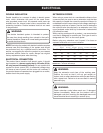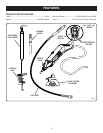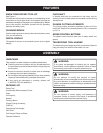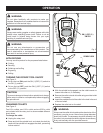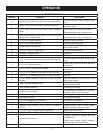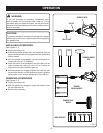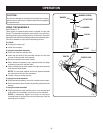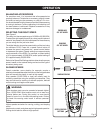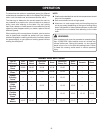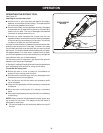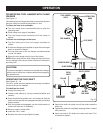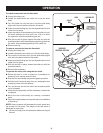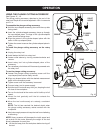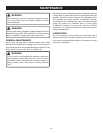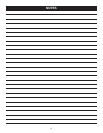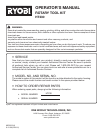
15
OPERATION
To determine the optimum operational speed for different
materials and accessories, refer to the Speed Dial Settings
table. Look this table over and become familiar with it.
The best way to determine the correct speed for work on
any material is to practice for a few minutes on a piece of
scrap, even after referring to the table. You can quickly
learn that a slower or faster speed is more effective just by
observing what happens when you make a pass or two at
different speeds.
When working with a scrap piece of plastic, start at a slow
rate of speed and increase the speed until you observe
whether the plastic is melting at the point of contact; reduce
the speed slightly to get optimum working speed without
melting the workpiece.
SPEED DIAL SETTINGS
Type of
Accessory
Soft
Wood
Hard
Wood
Laminates
Plastics
Steel
Aluminum,
Brass, Etc.
Shell/
Stone
Ceramic
Glass
Cut-off
Discs
25-30 18-30 10-18 10-18 10-30 — — —
Engraving
Cutter
25-30 25-30 15-25 25-30 10-18 — — —
Rubber
Polishing
Points
— — — 10-15 10-15 — — —
Aluminum
Oxide
Grinding
Stones
— — 10-15 — 10-18 10-18 — —
Silicon
Carbide
Grinding
Stone
— — — — 10-15 10-15 12-15 10-15
Wire
Wheels
10-15 10-15 — 10-15 10-15 10-15 — —
NOTE:
Plastic and materials that melt at low temperatures should
be cut at low speeds.
Soft wood should be cut at high speed.
Aluminum, tin, and copper, lead, and zinc alloys may be
cut at any speed, depending on the type of cutting being
done. Use paraffin or other suitable lubricant on the cutter
to prevent the cut material from adhering to the cutter
teeth.
WARNING:
Wire brushes must never be operated at speeds higher
than 15,000 RPM. Wire brushes must run at least one
minute before use. During this period, no one should
stand in front of or in line with the rotating brush. Failure
to heed this warning could result in serious personal
injury.



